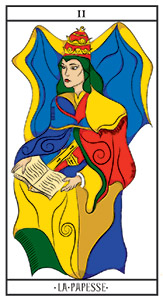Card number II from the Tarot of Marseille bears the image of a woman, sat with a book open on her lap. She represents teaching and learning. The four elements of life were shown on the preceding card, and here it is knowledge that is being represented - books are a sign of knowledge. The Papess is calm. She wears a veil - perhaps she lives outside of the world, learning from books rather than experience? The Papess is the Pope's companion. This card evokes everything to do with knowledge, words, writing and culture. It also represents solitude and calmness. It is a passive card, which can be said to symbolise wisdom and education.


Drawn face up
The card of the Papess drawn upright reveals that a situation is progressively changing, without being noticed. This is a positive card. The person who draws this card will progress mentally; the Papess has nothing to do with the material world. She acts in the mind. This card, along with the Magician, defines the two ways to follow: acting in the physical world, and acting in the mind.
The Papess is a sign of patience, fecundity and tranquility. It is a card that announces doubt or reflection, far removed from any anger. Its meanings: stability, reflection, wisdom, meditation, serenity, waiting
Drawn upside-down
The Papess card drawn upside-down means the complete opposite. It is a sign of instability, excess, impatience, anger, pettiness and vengeance. Upside-down, the Papess is a bad card: it will bring to light a problem, an obstacle, that hasn't been dealt with, and the violent desire to change the situation.
Its meanings: vengeance, divorce, separation, sterility, laziness, falsity, indecision, a hole, spite
Summary
The Papess is a symbol of fertility and knowledge. It is the card of peace and meditation.






